The Irish Lady- Nye (OH-SC) 1937 Lomax
[From Songs Our Singing Country- Lomax; 1941; Minnie Floyd was recorded in 1939; Nye in 1937.
This ballad is not to be confused with the popular ballad, Child No. 73 Lord Thomas and Fair Annet, which is commonly known in the US, and Canada as "The Brown Girl."
US and Canada versions are based on the hundreds of late 18th century English broadsides sometimes titled "The Sailor from Dover" or "Sally and her Truelove Billy."
Child's B version of 295, "The Brown, Brown Girl" collected by Rev. S. Baring-Gould, introduced stanzas from the "Sally and her Truelove Billy" songs. In his article "Folk Song Tradition, Revival and Re-Creation" Steve Gardham has shown that Baring-Gould's ballad is a re-creation of two ballads and not traditional.
To put it simply, the versions are not closely related to "The Brown Girl" but are part of the "The Sailor from Dover" and "Sally and her Truelove Billy" song group. In the US and Canada some common titles are "Pretty Sally," "Sally," and "A Rich Irish Lady." They have been put here following Bronson and others who have attached them to Child 295, not because they belong here.
R. Matteson 2014]
Bio Captain Nye: Born on the canal boat "Reform" on February 5, 1872, Nye literally spent his life on the Erie and Ohio Canal. He lived and worked on the canal, and, after his father died, he became captain of one of his family's boats, which he helmed until the canal ceased operating in 1913. Nye never married, or, rather he was married to the "Big Ditch."
When the canal closed, Nye worked tirelessly to preserve its history and culture, including the survival of its oral tradition. John and Alan Lomax, under the auspices of the Library of Congress, recorded more than 70 of Nye's songs with commentary. Nye also contacted local historical organizations and libraries about preserving his materials and collaborated with an author to write a book about his life on the canal. In 1950, the captain died before he could find the in-depth collector he so wanted.
THE IRISH LADY
Tune and first stanza. No. 1608. Capt. P. R. Nye, Akron, Ohio; other stanzas, No. 1302B. Mrs. Minnie Floyd, Murrells Inlet, S.C., 1937. See "Pretty Sally," Cox, p. 366; 'The Brown Girl," Child No. 295; Sh, 11366, Be, p. 12.
"Maybe they did die of broken hearts in the old days when they used to think that if they didn't get the man they wanted they were ruined forever. Nowadays they have learned that if they don't get one man, they'll get another one."

1 A rich Irish lady from Ireland came,
A beautiful damsel called Saro by name,
Her riches was more than a king could possess,
Her beauty was more than her wealth at its best.
2 A lofty young gentleman a-courtin' her came,
A-courtin' this damsel called Saro by name,
"O Saro, O Saro, O Saro," said he,
"I fear that my ruin forever you'll be."
3 "I fear that my ruin forever you'll prove
Unless you turn all your hatred to love."
"No hatred to you nor to no other man.
But this, for to love you is more than I can."
4 "So end all your sorrow and drop your discourse,
I never will have you unless I am forced."
Six months had appeared and five years had passed,
I heard of this damsel's misfortune at last.
5 She lay wounded by love and she knew not for why
And sent for this young man who she once did deny.
By her bedside those words they was said,
"There's a pain in your side, love, there's a pain in your head."
6 "Oh, no, kind sir, the right you've not guessed,
The pain that I feel here sits all through my breast."
"Am I your doctor and am I your cure?
Am I your pertector [1] you sent for me here?"
7 "You are my doctor and you are my cure,
Without your pertection I'll die, I am sure."
"O Saro, O Saro, O Saro," said he,
"Don't you remember when I first courted thee?
8 "I asked you in kindness, you answered in scorn,
And now I'll reward you for the time past and gone."
"Time past and gone I hope you'll forgive
And grant me some longer in comfort to live."
9 "I'll never forgive you as long as I live;
I'll dance on your grave, love, when you're laid in the ground."
Off of her fingers gold rings she pulled three,
Said, "Take them and wear them while you're dancing on me."
10 "Adieu to my friends, adieu, all around,
Adieu to my true love, God make him a crown;
I'll freely forgive him although he won't me,
My follies ten thousand times over I see."